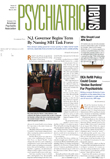APA has written a letter to two members of Congress thanking them for having introduced a bill to help people with a history of homelessness and mental illness attain stability in their lives.
The two were Sen. Mike DeWine (R-Ohio) and Rep. Deborah Pryce (R-Ohio), who introduced the Services for Ending Long-Term Homelessness Act in their respective houses of Congress last month.
The legislation is designed to make resources available through a matching-grant program to state and city agencies to fund and coordinate a range of services that will enable chronically homeless people to live successfully in the community. The program would be run by the Substance Abuse and Mental Health Services Administration (SAMHSA).
“Chronically homeless” is defined in the bill as applying to an individual or family who is currently homeless, has been homeless continuously for at least one year or has been homeless on at least four separate occasions in the last three years, and has a head of household with a disabling condition. Disabling conditions include mental illness, substance use disorder, or physical illness or disability.
Among the services that the bill would support are mental health and substance abuse treatment, case management, general health care referrals, life-skills training, parental-skills training, and family support.
Qualifying individuals would generally have access to these services once they are in permanent supportive housing or scheduled to enter such housing. Housing that is considered “supportive” includes access to services to help residents maintain their independence and stability.
The bill notes that an estimated 200,000 to 250,000 individuals in the United States experience chronic homelessness. About one-third of all homeless individuals have mental illnesses, according to a national clearinghouse.
“As the President's New Freedom Commission on Mental Health recently documented, affordable housing alone is not the only answer for many people with severe mental illnesses,” wrote APA Medical Director James H. Scully Jr., M.D., in the letter. “As your legislation acknowledges, flexible, mobile, individualized support services are also vitally necessary.”
A recent study by the University of Pennsylvania found that each unit of supportive housing for homeless individuals with mental illness in New York City resulted in a savings of $16,281 a year in multiple systems of care including mental health, human services, health care, veterans affairs, and corrections, according to the bill.
The legislation would also encourage SAMHSA to coordinate its efforts with the Department of Housing and Urban Development, as well as with other federal departments and agencies, to develop and provide more effective strategies to combat chronic homelessness.
“APA has long advocated for these types of services and programs,” wrote Scully. “Your bill will help Americans recovering from mental illnesses and substance abuse disorders by providing them with a little assistance to achieve and sustain their independence.”
The text of the Services for Ending Long-Term Homelessness Act can be accessed online at<http://thomas.loc.gov> by searching on the bill name or number, S 709 or HR 1471. ▪
